What we intended
The initial goals, as stated in my introduction article, were three-fold:
- Make a full game, from A to Z, and make it as high quality as possible. Focus on the details, create a well polished experience.
- Sell the game. Talk about it, market it, put it where people can find it and buy it. Note that this is not about making money, but about the process of getting to the point where you can start making money.
- Test ourselves to see if we are suited to working together in an actual studio.
The plan was to do all that in about three months. Guess what? We failed. :-)
Four months later, we just finished our production phase, and enter a post-production phase. Here's what happened during those four months, and a bunch of lessons I learned from this experience.
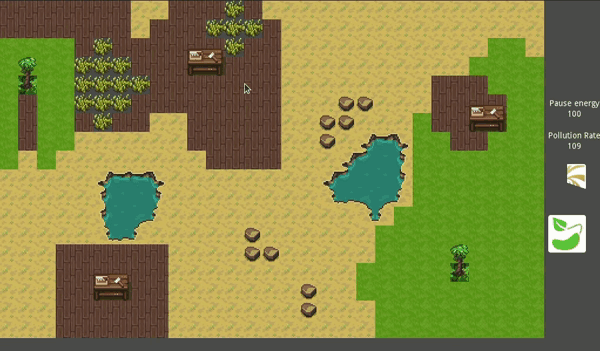
Phytomancer in April
What actually happened
My rough, initial planning accounted for 3 weeks of production, following 2 weeks of pre-production. I think we did the pre-prod in about 3 weeks, but then production took us approximately 4 months to finish. We had to set ourselves a strict deadline and cut a few features to reach an end to that phase. We could have gone on for at least another month, maybe two, with what we had planned.
Phytomancer is in an OK shape, but far from "commercial quality". It really needs a post-production phase, to polish a lot of things, add necessary feedback in many places, implement some missing features (like internationalization). I also think we made game design mistakes, that it's too late to fix easily.
By the end of the production of the game, there were only 4 of us left, out of the starting 7. Two folks left the project for personal reasons, and one because of internal conflicts.
We sadly did almost no marketing of our game, for various reasons. One of them is that our marketing person had to leave the team for personal reasons. The rest of us were focused on our respective parts, and well, marketing just never was a priority. We did, however, work on a trailer which I am excited about, and I hope we'll be able to finish it (with footage from the polished game) and share it soon!
Quickly after production was finished, we reached out to a publisher that we thought was just perfect for our situation, and got turned down with detailed feedback. Essentially, they had concerns about the core game design, the art direction, and the "marketability" of the game. I believe all of their feedback is very valid, and in the next part I'll go through what I believe are the reasons for those problems.
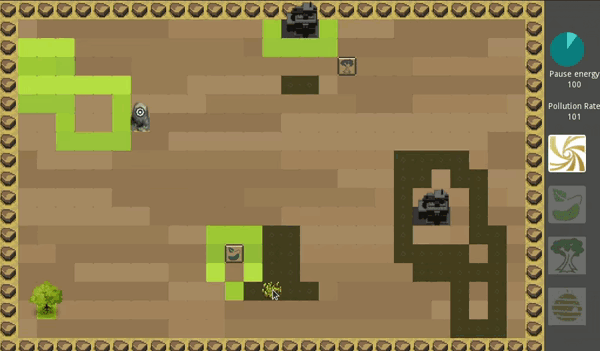
Phytomancer in May
What went wrong
I think we made a loooooot of mistakes with this project. And that is great, because it was part of the goal: make mistakes on this low-stake project, so we can learn and not repeat them for the next game.
Most of our mistakes were organizational. We started the whole process without much experience making games outside of game jams or solo projects. We tried to find a good compromise between individual autonomy and project management, and ended up too far on the autonomy side. We did not account for the fact that we were fully remote, and didn't do enough meetings, especially at the beginning, when we needed to synchronize our vision. We struggled with the limited availability of some team members who had other jobs, causing friction in some areas.
Let me run down a list of what I believe were our major mistakes.
Not enough processes
We didn't have enough processes. The only thing that we enforced was a weekly team meeting where everyone was to share what they had done the previous week, what they intended to work on next, and if they were blocked by anything. That was not nearly enough. We didn't take the time to list the work we had to do and prioritize it. We didn't dedicate time to offering constructive criticism about other people's work.
This had several consequences on the team. There were frustrations about some parts of the game that were not living up to our standards, but we didn't say it out loud. There were unspoken conflicts about art direction, and no clear arbitration.
There were communication issues. My analysis is that we had people who preferred very short, super efficient meetings, and others who wanted to have time to talk about anything and everything, very organically. We had people who were comfortable with writing a lot, and others who disliked it and preferred to talk about things. There was not clear way of communicating that worked for everyone, and we tried to accommodate everyone by, well, not enforcing anything. We had our weekly meetings, our discord server and a loomio forum, but it was not quite clear what each was used for.
Here's what I would do today if I were to start again:
- Have much more meetings at the start of the project, to make sure that the vision about the game is very well shared among team members.
- Use an actual management tool to track features and priorities. We've actually started doing that by the end of production, and again in post-production. We use a kanban board, with high level tasks. Each month, we choose the tasks that we want to do, then prioritize them. Every week, we take a look at that board and update it.
- Dedicate a time slot to constructive criticism about the current state of the game. We've started doing "Criticism Fridays", every other week, where we all take some time to play Phytomancer and write feedback about pretty much anything that we want. We then share that feedback in a loomio thread, and discuss it at the following weekly meeting.
- Clarify communication rules. Make sure everyone knows what each platform is for, and use it accordingly.
Here are some resources to go further on these topics:
- Designing A Production Process, by Ryan Darcey
- Group Chat: The Best Way to Totally Stress Out Your Team, by Basecamp
Not enough preproduction
We did not spend nearly enough time in preproduction. That seems to be a pretty typical problem for game companies, as I've read many similar stories. In part 3 of previously linked article "Designing A Production Process", Ryan Darcey writes that "if you're doing it right, a day spent in this [preproduction] phase is worth a week (or more) in the later phases". We spent less than 3 weeks in preproduction, and 4 months in production. We made mistakes in production because we did not go far enough in preprod.
For example, up until the last week of production, all of our levels still had temporary art decorations. When we finally started working on those decorations, we realized that it would actually take time to make something that worked. We could, and should, have anticipated something like that by just doing one entire level, even a fake one, in preproduction.
Lesson learned: do not start production until you are confident about the game and have made the most out of your preproduction.
No market research
This final mistake is not a big one, especially considering the scope of the project, but still one that I do not want to repeat for my next games. We did very little market research for Phytomancer, and did not work on our marketability. We didn't ask ourselves how we would sell the game, how we would make players want to play it. We did not ask ourselves how much money we could make by selling the game.
And that was kind of intentional. There is no money involved in this project, no one is getting paid (until we make money out of the game, if ever), and thus we didn't seriously consider budgeting. But we should have. Because that is one of the first things you want to do when you run an actually game company.
I want my next games to generate money, so that I can live comfortably while doing what I love. But it's hard, extremely hard, and asking ourselves the right questions, right from the start, is a good way to succeed. "Will we make money with this game?" is a very important question.
Here's a great article on this topic: How to market your indie game: a 10 step plan.
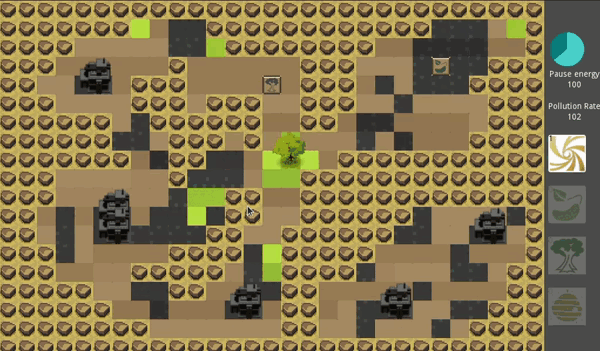
Phytomancer in June
What went right
Not all of it was negative though. The first thing that went well is plain and simple: we actually made a game! That was the most important part, and we succeeded.
One thing I am particularly proud of is that the game has very little known bugs. We haven't released it yet and I'm sure as people will test it on more wild settings we'll get reports, but so far, it is really stable. That is not to say there has been no bugs: of course there were many, but we made a good job of fixing them early on.
Of course, I learned a ton of things making Phytomancer. I learned how to actually use Godot (and consequently why I do not like it). I learned more about working in a horizontal organization, with its benefits and struggles. And I learned a lot about producing a game! Having only worked on games either by myself or in short contexts like game jams, I was naive to think we could avoid processes and tools like an issue tracker. Clearly I was wrong: it is necessary, in a team, to always have a clear vision of the game, how it's progressing, what the top priorities are, etc. And that is even more true in a horizontal organization, as the responsibility for deciding the future is shared among the team.
But the most important thing that went well, I believe, is that I got to learn a lot about the people I worked with. That was my third goal with this project, to be able to answer this simple question: "should I create a studio with these folks?" My answer was "no" for everyone except one person. The reasons for that are various and concern only them and me, so I won't talk about it here. But I for one am really glad that I was able to get a clear answer before we actually started anything serious, like founding a company together.
The process of telling ourselves what we thought was difficult for me, but I'm quite happy with the way we did it. We had very calm and respectful conversations, everyone listening to what the others had to say, and in the end I believe everyone agreed with our decisions. We are in good terms, and we will each continue our own adventures while staying in touch.
Speak now or forever hold your peace
Specifically, our conversation was structured this way: we had three questions, and we took turns answering them (everyone answered the first question, then everyone answered the second… ). Here are the questions:
- What went well and what frustrated me? (introspection)
- What did I learn? (lessons)
- What do I want to do next? (future)
We also had individual conversations to give each others feedback more privately.
Handling conflicts, disagreements, frustrations, is a very difficult thing to do, at least for me. In the end, the only viable solution is to talk about the struggles, with the people involved, as early as possible. You can do that either by building a strong trust between each team member, making them feel safe to tell what they think whenever needed. But if that is not (yet) the case, and maybe even if that is the case, you need to have some form of process (like a dedicated meeting), or some space, or maybe just someone, that is there for people to talk about what's going wrong. Unspoken frustration is the path to the Dark Side. Do whatever you can to avoid it!
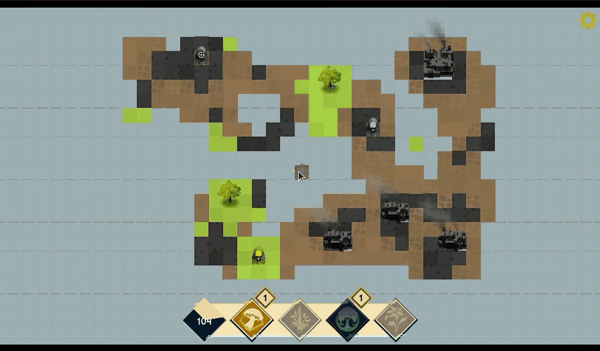
Phytomancer in July
What's next?
That's it for my post-mortem of our production period! We are now in the middle of our post-production period. We expect it will last 2 months, during which we intend to bring the game to commercial quality. We were hoping to find a publishing partner, but given the time we have left and a previous failure with a publisher that seemed to be a perfect fit for us, we've decided to self-publish Phytomancer. Expect to be able to buy it some time in October! I will of course let you know here and on social media when the game is released.
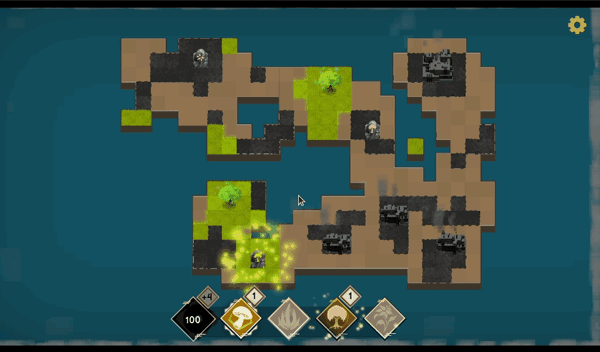
Phytomancer in September
Follow me on this blog, on
Twitter or on
Mastodon to get updated when we release Phytomancer!


Comments
Merci pour ce post-mortem
Je me rend compte de la quantité astronomique de choses qu'on ne fait pas correctement mais c'est juste trop dur de les faire bien :cc
Gérer un projet / le planning / la simultanéité et l'efficacité de toutes les tâches et du marketing je trouve que c'est vraiment le plus dur, faire le jeu c'est "facile" pour ainsi dire x)
Sans parler de rajouter à ça la fondation d'une entreprise en même temps...
Sometimes going solo is easier, faster and less frustrating. Don't think you need others to be a real company.